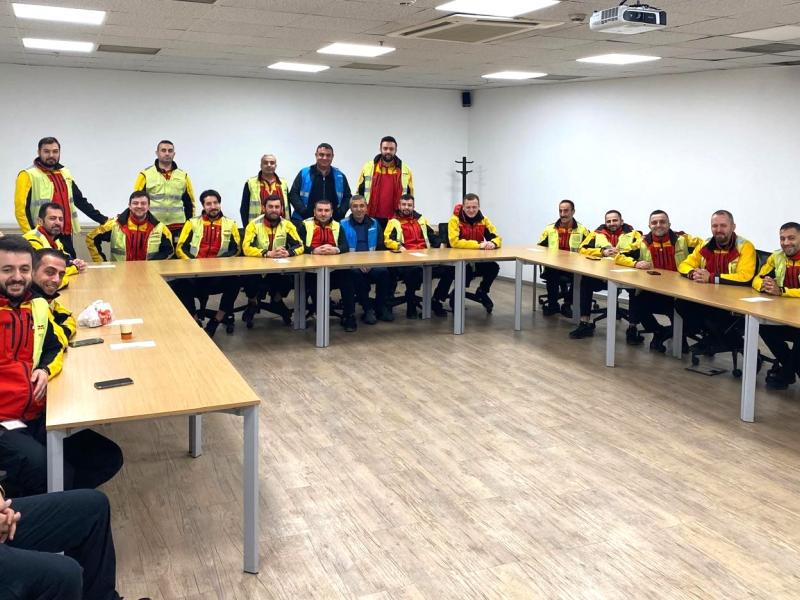Report launched by Indian transport unions along with other Indian unions today gives an unprecedented view of how domestic violence impacts the working lives of women workers in India, and how experiences of domestic violence extend directly into their work and workplaces.
The study provides the first comprehensive investigation of the impacts of domestic violence in the workplace in India based on survey data from 15,561 workers from across India’s transport and other sectors, 98% of which were women.
The report’s findings show that domestic violence is a problem for a significant number of working women, and reveals how experiences of domestic violence extend directly into the workplace.
75% of women who responded to this survey reported direct or indirect experiences of domestic violence in their lifetime, with 9 out of 10 women saying that personal experiences of domestic violence affected their ability to work,” said Sheela Naikwade, Vice President of Maharashtra State Transport Kamgar Sanghatana (MSTKS).
“This study itself has already been instrumental for breaking stigma and starting the discussion about domestic violence for women working in transport and other sectors. The report’s findings are clear, domestic violence is a workplace issue, and it’s time that governments, employers, unions and civil society organisations establish proactive practices, agreements and legislation to address the impact of domestic violence at work.”
“These findings must drive awareness to the issue, drive change in social norms around toxic-masculinity, and importantly be a catalyst for employer and trade union action, as well as changes to national laws and legislation to eliminate domestic violence and mitigate its impacts in the workplace,” said Naikwade.
Pratibha Gajbhiye from the Tata Institute of Social Sciences 'Malha kai bolaicha aahe' Helpline said that, “With the sudden surge in domestic violence that we have seen during the Covid-19 pandemic, and the many women contacting the helpline for support, this report comes at a very significant time.”
The report highlights the alarming prevalence of domestic violence experienced by women workers in India, the detrimental impact that those experiences have on workers and their colleagues, the discrimination directed at those who report abuse by employers as well as strong calls for support from governments to prevent and address domestic violence.
Key findings include:
- 47% of respondents reported direct experience of domestic violence.
- 24% of respondents reported direct experience of domestic violence in the past 12 months.
- 26% of respondents reported knowing someone at work who has experienced domestic violence.
- 92% of respondents reported that experiences of domestic violence affected their ability to work.
- 77% of respondents reported discrimination from their employer after reporting their experiences of domestic violence.
- 23% of respondents reported losing their job because of their experiences with domestic violence.
- 74% of respondents reported that workplace support – such as paid leave, education, training and safety policies– can reduce the effects of domestic violence on workers’ work lives.
- 87% of respondents reported that governments should implement laws to prevent and address domestic violence.
The groundbreaking study was conducted by Indian transport unions (listed below) along with other sectors’ unions (Education, health workers, domestic workers and Construction/ daily wage workers) and supported by researchers at the Centre for Research & Education (CREVAWC) at Western University in partnership with the Domestic Violence at Work Network and the International Transport Workers’ Federation (ITF).
“The ITF is extremely proud of women union leaders in India who have led this work. This study leaves no doubt that domestic violence is a problem for many working women in the transport industry. The numbers are alarming, the personal toll is alarming, and so too is the pervasiveness of that violence into the workplace”, said ITF General Secretary Stephen Cotton.
“For all of our sisters, brothers and friends in the global trade union movement, we must recognise and prioritise domestic violence, it is a union issue, it is a workplace issue, and we must continue to raise awareness and campaign to eliminate violence against women.”
“Governments, employers, the challenge is now for you to listen to the thousands of women who responded to this survey and engage with unions and civil society to take action”, said Cotton.
Coalition of Indian unions who conducted research:
- Maharashtra State Transport Kamgar Sanghatana (MSTKS)
- All India Railwaymen's Federation (AIRF)
- National Federation of Indian Railwaymen (NFIR)
- Mumbai Port Trust, Dock & General Employees’ Union
- National Union of Seafarers of India (NUSI)
- Madras Port Trust Employees' Union



